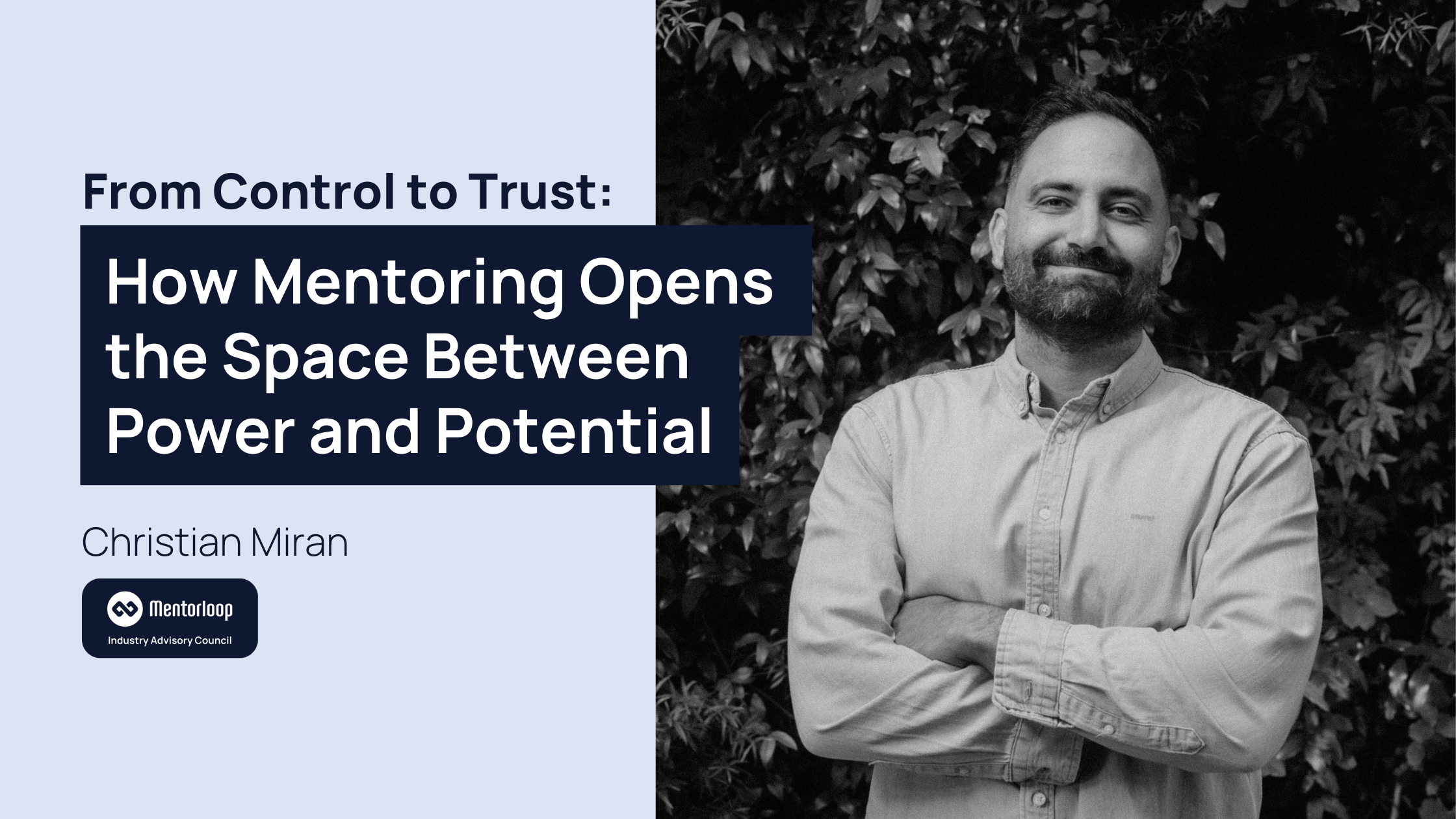
Transformational guide and Mentorloop Industry Advisory Council member, Christian Miran—Chief Disruptor at Thrive Nation—shares his insights on why traditional, controlling management is failing in today’s evolving workplace and why trust is important in leadership today.
There’s a space that exists between power and potential. When Dutch home-based healthcare organisation Buurtzorg’s CEO and founder Jos de Blok removed all managers from his healthcare organisation, he stepped into this space. He wasn’t adding a mentoring program – he was changing how work happens. Years later, Buurtzorg has transformed healthcare by living in this space.
Why Control Fails
Traditional management was designed for a simpler world. Today’s challenges need something different – the ability to create spaces where good work can happen on its own. When neuroscientist Paul Zak studied trust, he made an interesting discovery about human biology: in environments of trust, our brains release oxytocin, making us more creative and connected. But when someone controls us, stress hormones kick in and we shut down. The very things leaders are trying to create – great work, performance, innovation, breakthroughs – become impossible under control.
A New Way of Working
Leading organisations are reshaping how work happens to foster accountability and trust in leadership and the broader organization. In doing so, they’re transforming leadership positions into roles of mentorship and coaching.
Over time, manager positions have become gatekeepers, focusing on quality control, rostering, and reporting—tasks that feed the system but don’t change the system. A new way of working demands a new type of leadership—one rooted in trust.
At global manufacturing company W.L. Gore & Associates Inc., they replaced managers with “sponsors” – guides who help people find their way rather than tell them what to do.
When employee experience software company Culture Amp completely separated mentoring from day-to-day operations, they created two distinct paths: one for development and one for work tasks. Each person had a dedicated mentor focused purely on their learning and growth, while Team Leads guided the daily work and team goals. This split allowed for deeper development without the complications of reporting lines getting in the way.
This isn’t about removing all structure. It’s about finding a better way to work. Like jazz musicians knowing when to lead and when to support, these organisations have learned a new rhythm.
Mentoring as the Heart of Work
In these organisations, mentoring isn’t something extra – it’s how work gets done:
- Decisions grow from conversations, not commands
- Learning happens in the work, not separate from it
- Problems get solved through shared wisdom
- New ideas emerge from guided experiments
At Buurtzorg, when nurses face a tough challenge with a patient, they don’t run to a manager. They turn to each other. They ask questions. They share stories. They find answers together.
Why Peer Mentoring Works
Great organizations bring mentoring to life by embedding peer learning opportunities into the natural flow of work. Rather than being a separate initiative, mentoring happens organically through everyday interactions and structured yet informal practices.
Case Clinics: Turning Challenges into Learning Moments
Case Clinics transform real-world challenges into opportunities for growth. When someone encounters a difficult situation, a small group gathers for an hour. One person shares their challenge while others listen deeply and ask thought-provoking questions that help new thinking emerge. No one jumps to solutions. Instead, the group creates a space where insight can surface. At Buurtzorg, nurses use these clinics to crack complex patient care challenges that previously would have needed a manager’s input.
Learning Circles: Creating a Culture of Shared Growth
Learning Circles establish a rhythm of continuous and shared growth. Every week or two, teams come together to explore what they’re discovering in their work. At Gore, these circles are where real innovation happens. Someone shares a challenge they’re working through, others connect it to their own experiences, and new possibilities emerge. These aren’t formal meetings – they’re more like conversations that help shape how work evolves.
Daily Practices: Weaving Mentoring Practices into Every Interaction
There are daily mentoring practices that successful organizations embed into how they work.
- Learning Moments: Teams begin meetings by sharing quick insights or recent lessons learned
- Project Pairing: Experienced team members collaborate with newcomers, creating a two-way learning experience
- Post-Project Reflection: After key moments, teams pause to ask: What worked? What didn’t? What did we learn?
- A Culture of Asking and Offering: People openly seek help and offer support, recognizing that teaching often deepens understanding
These practices ensure that mentoring happens naturally as how work gets done instead of being add-ons to work. They create natural moments where everyone can be both mentor and mentee, regardless of their role or experience level.
Starting the Shift
For leaders ready to try this new style of work, here are practical steps to begin:
- Be Real: Share your own learnings. Ask for help. Show it’s okay not to have all the answers.
- Make Room: Create actual spaces and time for learning conversations. Protect them. Don’t let them get deprioritised.
- Start Small: Let one team try new ways of working. Let trust in both leadership and among each other build naturally.
- Change How We Talk: Less about “driving performance,” more about “helping each other grow.”
Why This Matters
Organisations that work this way are seeing real results:
- More new ideas
- People stay longer
- Work gets better
- Change happens easier
- People enjoy their work more
Research shows that Generation Z actively seeks workplaces that trust more and control less. The trend of “unbossing” reveals that younger workers increasingly reject traditional management roles.
This shift isn’t just nice to have – it’s necessary. As work gets more complex and old ways stop working, organisations that trust more than they control will do better.
The question isn’t whether to make this change, but how to begin. As Zak’s research shows, when we trust instead of control, we don’t just work better – we come alive. In today’s world, that might be the most important thing of all.
Learn more about how Christian Miran helps organization pioneer new ways of working, cultivating leadership through transformative change programs and developing the capabilities needed for the future of work.




